Table of Contents
Get started with MyPerfectResume today!
- Build a resume on any device
- Pick an ATS-friendly template
- Tailor with AI copy suggestions
Why this resume works
- Quantifies accomplishments: By showcasing a 30% improvement in resident wellness and reducing incident reports by 10%, the applicant’s measurable achievements deliver compelling evidence of their ability to drive positive outcomes.
- Highlights industry-specific skills: Bringing together skills like crisis intervention and cognitive behavioral therapy, the applicant aligns closely with mental health support roles, emphasizing readiness for sector-specific challenges.
- Showcases career progression: Progressing from a behavioral health aide to residential counselor reflects the applicant’s growing expertise and capacity to handle increased responsibilities over time.
More Residential Counselor Resume Examples
Our residential counselor resume examples show how to emphasize your empathy, conflict resolution skills, and experience in supporting residents. Use these mental health resume samples to create a resume that showcases your ability in residential care roles.
Entry-Level Residential Counselor
Why this resume works
- Effective use of keywords: Integrating role-specific terms like “crisis intervention” and “group therapy facilitation” ensures alignment with keywords for applicant tracking systems (ATS) compatibility, helping the application stand out effectively.
- Centers on academic background: By emphasizing a master’s degree in counseling, the education section solidifies a strong academic foundation pivotal for early-career professionals entering therapeutic roles.
- Maximizes readability: The effective use of whitespace and straightforward section headings help ATS and recruiters quickly scan the resume.
Mid-Level Residential Counselor
Why this resume works
- Points to measurable outcomes: Reducing incident reports by 30% in a year reveals the applicant’s proactive approach to creating safer environments and improving residential care quality.
- Demonstrates language abilities: The applicant’s language skills in Spanish, French, and German support effective communication in diverse settings.
- Displays technical expertise: Certified as a residential counselor and behavioral health technician, the applicant showcases specialized expertise important for effective client management and support.
Experienced Residential Counselor
Why this resume works
- Lists relevant certifications: By listing certifications such as Certified Residential Counselor, the applicant showcases a commitment to professional growth and expertise.
- Showcases impressive accomplishments: Developing an educational program adopted by five communities reflects significant accomplishments that indicate senior-level impact and innovative contribution.
- Focuses on work history: The applicant uses a chronological resume format, effectively highlighting extensive work history and career progression over twelve years in community services.
Residential Counselor Resume Template (Text Version)
Donna Bryant
Parkview, MO 65702
(555)555-5555
Donna.Bryant@example.com
Professional Summary
Skilled residential counselor with 8 years in mental health roles. Expert in case management and crisis intervention, enhancing resident care and therapeutic outcomes.
Work History
Residential Counselor
Compassionate Living Services – Parkview, MO
June 2024 – August 2025
- Managed case plans for 20+ residents
- Improved resident wellness by 30%
- Conducted 15+ group therapy sessions
Mental Health Support Worker
BrightPath Caregiving – St. Charles, MO
January 2020 – May 2024
- Facilitated recovery programs with 25% success
- Reduced incident reports by 10%
- Delivered daily reports on client progress
Behavioral Health Aide
Golden Years Home Care – Chesterfield, MO
August 2017 – December 2019
- Supported 50+ clients with personal care
- Organized therapeutic community events
- Exceeded care plan goals by 15%
Skills
- Case Management
- Crisis Intervention
- Group Counseling
- Cognitive Behavioral Therapy
- Communication Skills
- Empathy and Compassion
- Conflict Resolution
- Behavioral Analysis
Education
Master of Social Work Social Work
University of Illinois Chicago, IL
May 2017
Bachelor of Arts Psychology
Illinois State University Normal, IL
May 2015
Certifications
- Certified Crisis Worker – National Board for Certified Counselors
- First Aid CPR AED – American Red Cross
Languages
- Spanish – Beginner (A1)
- French – Intermediate (B1)
- German – Beginner (A1)
Related Resume Guides
Advice for Writing Your Residential Counselor Resume
Check out our tips on how to write a resume specifically tailored for residential counselors, and discover how to showcase your empathy, problem-solving abilities, and commitment to making a positive impact in people’s lives. Dive in and make sure your resume stands out!
Write a strong professional summary
A professional summary is the opening section of a resume designed to quickly introduce your qualifications to hiring managers.
Typically, a professional summary consists of three to four sentences highlighting your work experience, key skills, and notable achievements. It’s best suited for applicants with relevant job history who want to showcase their professional identity and the value they bring to potential employers.
Resume objectives, on the other hand, are statements about career goals and future contributions. These are ideal for entry-level applicants, those switching careers, or individuals with employment gaps. Unlike summaries, objectives emphasize “what I aim to contribute” over past accomplishments.
Next, we’ll provide examples of both summaries and objectives tailored for various industries and experience levels.
Residential counselor resume summary examples
Entry-level
Recent graduate with a Bachelor of Arts in psychology and a certification in First Aid and CPR. Gained foundational skills through internships focusing on crisis intervention and supportive counseling for adolescents. Eager to contribute to the emotional well-being of residents and support experienced counselors in developing comprehensive care plans.
Mid-career
Residential counselor with over six years of experience in group home settings, specializing in behavior management and conflict resolution. Proven track record of implementing effective therapeutic activities that improve resident engagement and personal development. Experienced in collaborating with social workers to assess resident needs and tailor individualized care strategies.
Experienced
Seasoned residential counselor with a decade of expertise in leading programs for youth rehabilitation and family reintegration. Holds certifications in trauma-informed care and substance abuse counseling, adept at managing complex cases involving diverse populations. Renowned for cultivating strong relationships with community agencies to facilitate comprehensive support networks, driving significant improvements in resident outcomes.
Residential counselor resume objective examples
Entry-level
Dedicated and empathetic individual seeking an entry-level residential counselor position to support individuals in a group home setting. Looking to leverage strong communication skills and a passion for helping others to foster a safe and nurturing environment.
Career changer
Motivated professional transitioning into the role of residential counselor with experience in customer service and community engagement. Eager to apply interpersonal skills to build meaningful relationships and contribute positively to the lives of residents.
Recent graduate
Compassionate psychology graduate looking to begin a career as a residential counselor, aiming to use academic knowledge in mental health and behavioral strategies to support residents’ emotional well-being and personal growth within supportive living facilities.
Make a great resume quickly with our AI Resume Builder. Choose a template, add your details, and get a professional-looking resume in no time!
Include relevant certifications and training
Listing certifications and training is important for a residential counselor because it shows you have the skills and knowledge to help people effectively.
These credentials show that you’ve taken extra steps to learn more about your field. They can make you stand out when applying for jobs, especially in technical fields where specific skills are needed. By creating a dedicated certifications section, you can highlight these achievements clearly.
- Certified Clinical Trauma Professional (CCTP)
- Mental Health First Aid Certification
- Certified Addiction Specialist (CAS)
- First Aid/CPR Certification
- Certified Residential Care Administrator
Having the right certifications helps prove you’re ready for the job of a residential counselor. It shows employers that you take your professional development seriously and are prepared to handle various situations. These qualifications support your education and demonstrate your commitment to helping others.
Example of a certifications section
Certified Residential Counselor (CRC)
Issued by: American Association of Residential Counselors (AARC)
Issued 2022
First Aid and CPR Certification
Issued by: American Red Cross
Expires 2025
Crisis Prevention Intervention Certification
Issued by: Crisis Prevention Institute (CPI)
Expires 2026
Mental Health First Aid Certification
Issued by: National Council for Behavioral Health
Issued 2021
Trauma-Informed Care Certification
Issued by: Trauma-Informed Care Implementation Resource Center
Issued 2023
Take a look at our professional resume examples to see how other job seekers effectively showcase their qualifications.
Showcase your work experience
Showcasing your work experience on a resume is key to landing a job as a residential counselor. It allows employers to see how your past roles have prepared you for this position.
By listing your work experience in reverse chronological order, you make it easy for hiring managers to quickly identify your most recent and relevant roles. Start each entry with your job title, followed by the employer’s name, location, and employment dates. This clear structure creates a strong impression.
Use action-oriented language to describe what you did in each role. For example, instead of saying “responsible for counseling,” say “provided counseling to teens.” Highlight measurable results where possible, such as “reduced conflict incidents by 20% through effective mediation.”
This demonstrates the impact you’ve had in previous jobs. Focus on core responsibilities like managing client behavior, developing treatment plans, or coordinating with other care providers since these are essential skills for a residential counselor.
Including specific examples of your achievements can set you apart from others applying for the same job. Consider instances when you handled crises effectively or helped clients achieve personal goals. By detailing these experiences, you’re not just telling employers what you’ve done—you’re showing them how well you’ve done it and why you’ll be an asset in their organization.
5 residential counselor work history bullet points
- Implemented individualized care plans for 20+ residents, improving overall satisfaction ratings by 25%.
- Facilitated conflict resolution sessions, reducing incidents by 40% within the first six months.
- Conducted daily group therapy sessions, improving communication skills and social interaction among residents.
- Monitored medication administration for accuracy, achieving a 98% compliance rate over a year.
- Trained and mentored new staff members, resulting in a 30% increase in team productivity and efficiency.
Select a resume format that effectively highlights skills in policy development, hiring achievements, and expertise with HRIS tools.
Match your resume with the job description
Tailoring your resume to the job description is important because it helps you stand out to employers and pass through applicant tracking systems (ATS). These systems scan resumes for specific keywords and phrases from job postings, so aligning your resume with the job’s language increases your chances of being noticed.
An ATS-friendly resume incorporates keywords and phrases directly from the job listing. By matching these terms with your skills, you improve your likelihood of catching a hiring manager’s attention. Using tools and strategies to customize your resume can further refine this process, helping you align your experience with what the employer values most.
To identify keywords in a job posting, focus on frequently mentioned skills, qualifications, and duties. For example, if you’re applying for a residential counselor role, look for terms like “client support,” “behavioral management,” or “team collaboration” as they may be central to the position.
Integrate these terms naturally into your resume by rephrasing relevant experience. For instance, instead of stating “Managed client activities,” consider “Facilitated positive client interactions through engaging activities,” ensuring that you highlight skills tied to the job requirements.
Targeted resumes are highly compatible with ATS systems because they show both automated filters and hiring managers how closely aligned you are with the role.
Make sure your resume gets past applicant tracking systems! Our ATS Resume Checker spots common problems and gives advice to make your resume better.
FAQ
Do I need to include a cover letter with my residential counselor resume?
Yes, including a cover letter with your residential counselor resume is a smart move to make your application more compelling.
A cover letter gives you the chance to express why you’re passionate about working as a residential counselor and highlight specific experiences that align with the role.
For instance, if the facility emphasizes therapeutic approaches or has unique programs for residents, you can expand on your experience in those areas.
To make this process easier, consider using a Cover Letter Generator to craft a personalized cover letter or start from scratch using expert guidance and content suggestions.
Additionally, reviewing cover letter examples can provide you with inspiration and structure tailored to various roles within counseling and social services.
How long should a residential counselor’s resume be?
For a residential counselor, generally, a one-page resume is recommended to effectively showcase your key qualifications, such as experience with crisis intervention and counseling skills. Focus on highlighting your ability to work with diverse populations and any relevant certifications.
If you’ve accumulated considerable experience or specialized training in therapeutic techniques, consider using a two-page resume. Make sure every detail included is directly relevant to the role, emphasizing recent achievements and powerful contributions in past positions.
Explore our guide on how long a resume should be for more insights on tailoring your resume length to best represent your professional journey.
How do you write a residential counselor resume with no experience?
If you’re trying to write a resume with no experience for a residential counselor role, focus on highlighting transferable skills, relevant education, and volunteer work that aligns with the position. Here are some tips to help you get started:
- Emphasize your education: Begin by listing your degree, major, and institution. If you have taken courses in psychology, social work, or counseling, make sure to mention them.
- Highlight transferable skills: Residential counselors need empathy, communication skills, conflict resolution abilities, and patience. Identify experiences where you’ve demonstrated these skills—such as through volunteer work or school projects—and include them prominently.
- Include volunteer and extracurricular activities: If you’ve volunteered at shelters, youth programs, or participated in community service activities related to counseling or support roles, detail these experiences. Describe your responsibilities and what you learned from them.
- Add certifications or training: If you’ve completed any workshops or training sessions related to mental health first aid, active listening, or crisis intervention, list these certifications.
Rate this article
Residential Counselor
Share this page
Additional Resources
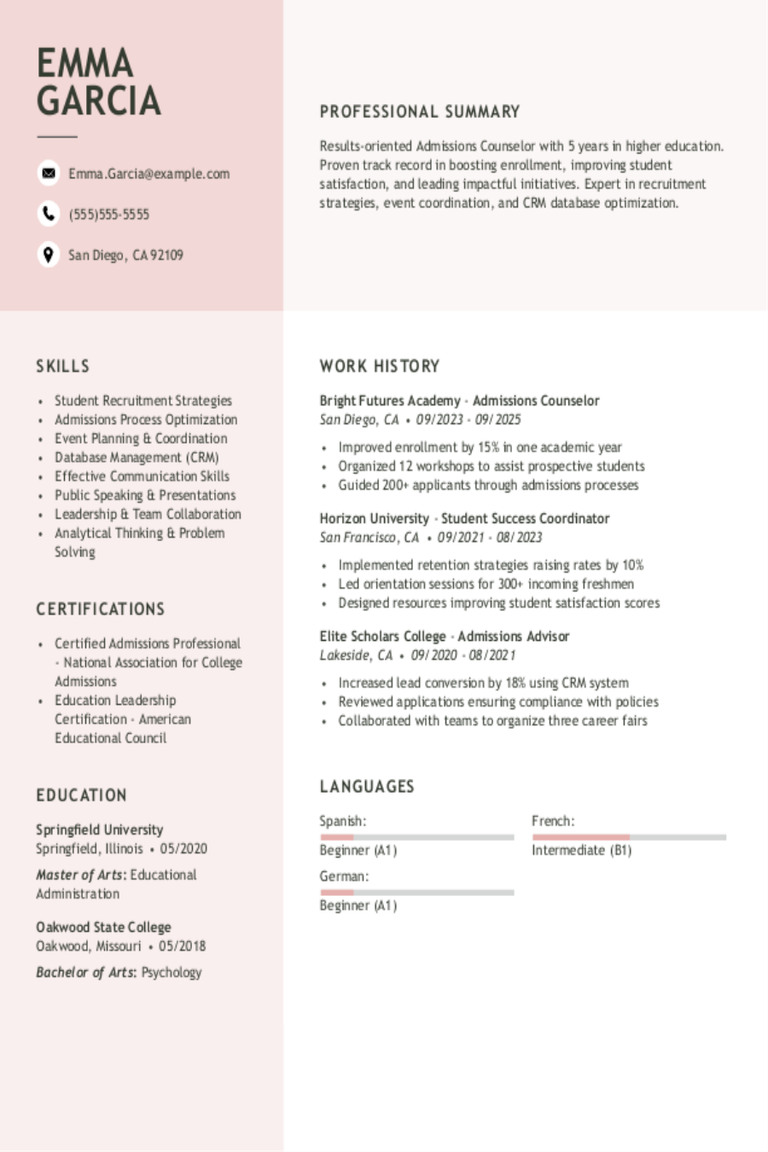
Admissions Counselor Resume Examples & Templates
Explore admissions counselor resume examples and tips to learn how to highlight your knack for guiding students, organizing events, and connecting with families to boost enrollment numbers.Build my resumeImport existing
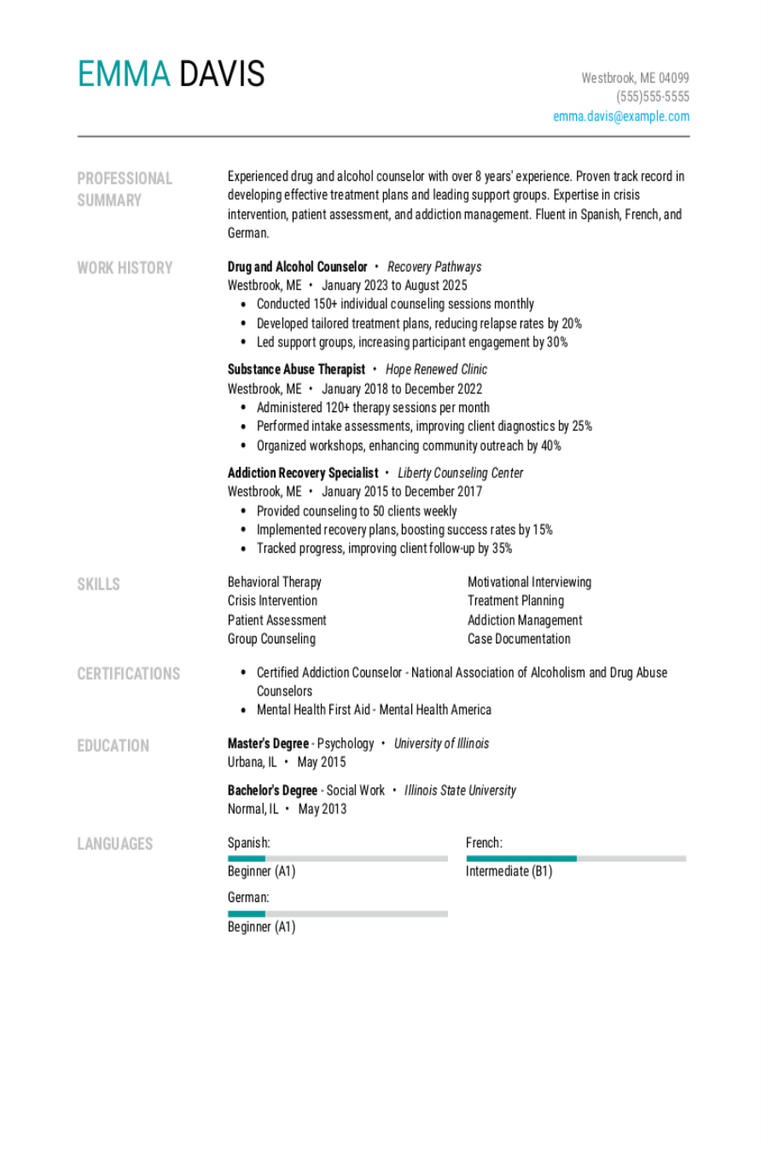
Drug And Alcohol Counselor Resume Examples & Templates
Discover drug and alcohol counselor resume examples and learn how to highlight your ability to support people in overcoming addiction and improving their lives.Build my resumeImport existing resumeCustomize this templateWhy
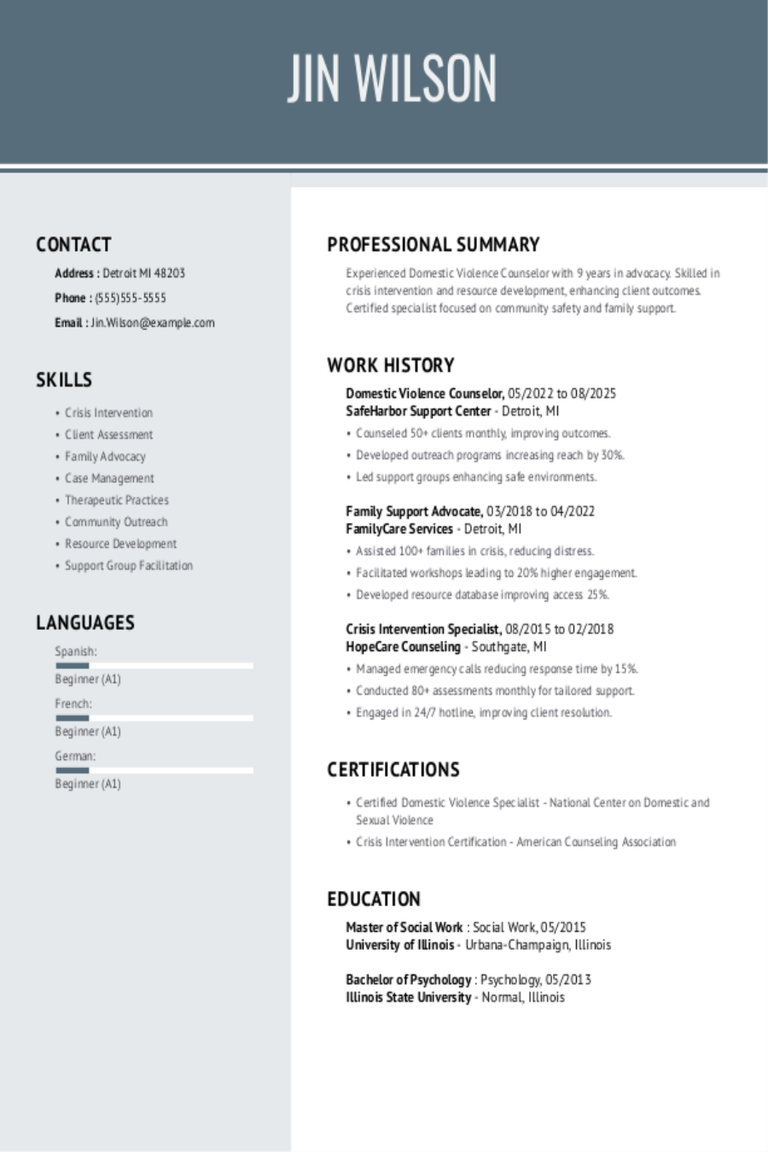
Domestic Violence Counselor Resume Examples & Templates
Explore domestic violence counselor resume examples and tips that will help you focus on empathy, active listening, and experience working with people in crisis.Build my resumeImport existing resumeCustomize this templateWhy
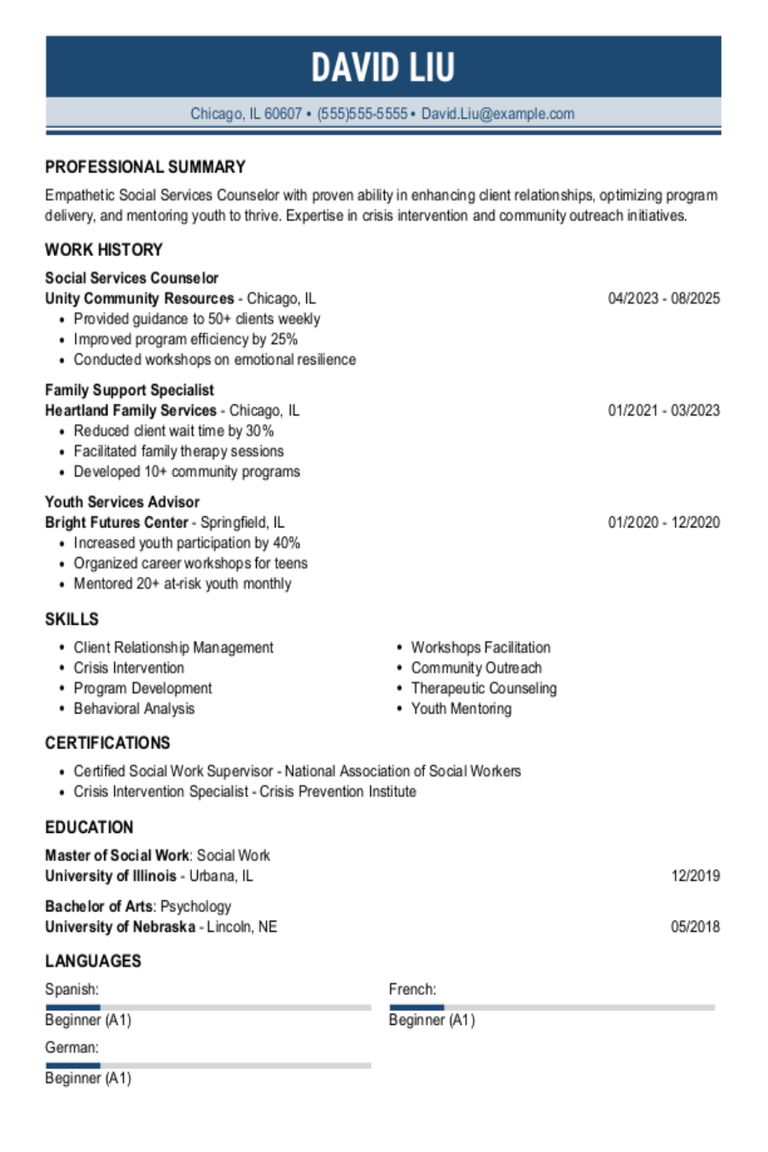
Social Services Counselor Resume Examples & Templates
Discover social services counselor resume examples and learn how to highlight important skills like empathy, active listening, and problem-solving to make your resume shine.Build my resumeImport existing resumeCustomize this templateWhy
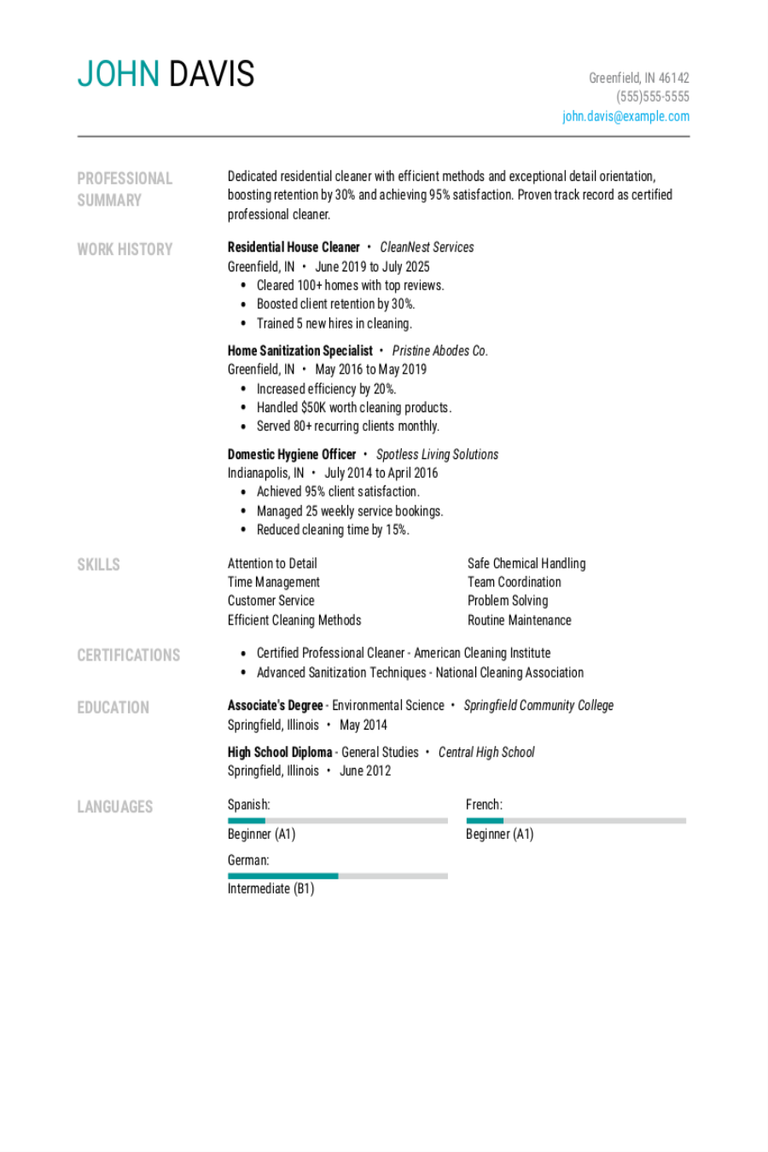
Residential House Cleaner Resume Examples & Templates
Browse residential house cleaner resume examples and expert tips to learn how to highlight your cleaning skills, eye for detail, and knack for keeping homes spotless.Build my resumeImport existing resumeCustomize

Camp Counselor Resume Examples & Templates
Discover camp counselor resume examples and tips that will help you show off your teamwork, problem-solving skills, and experience in nature settings.Build my resumeImport existing resumeCustomize this templateWhy this resume
